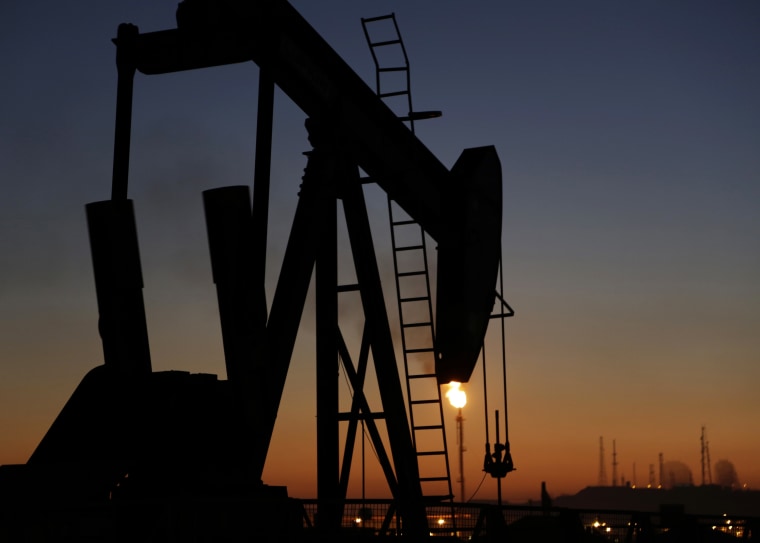President Donald Trump is scheduled to meet with executives from the energy sector on Friday afternoon, including the president and CEO of the industry’s largest trade group, the American Petroleum Institute.
In recent months, oil prices have fallen dramatically, and now, as the U.S. tries to mitigate the coronavirus outbreak, there is less demand for gasoline. On top of that, there is an overabundance of oil, dwindling storage capacity, and a price war between two major producers.
“It is as scary a time in the industry as we’ve seen,” says Praveen Narra, an oil analyst at Raymond James.
The economic downturn has hit the entire labor market hard, with 10 million Americans filing for initital jobless claims in the past two weeks. Friday's monthly employment snapshot from the Department of Labor showed the economy shed 701,000 positions during the month of March, a number that was larger than expected yet still surprising to many economists, who had predicted a loss of 100,00 jobs.
The U.S. natural gas, oil, and petrochemical industry directly employs 2.8 million men and women. The longer the crisis continues, the more jobs could be in jeopardy.
According to API, the U.S. natural gas, oil, and petrochemical industry directly employs 2.8 million men and women. The longer the crisis continues, and if supply and demand do not equilibrate, the more energy jobs could be in jeopardy.
Trump has begun to weigh in on the oil market's current woes. On Thursday, the president told CNBC and his 75.8 million Twitter followers he has tried to mediate a dispute between Russia and Saudi Arabia:
“Just spoke to my friend MBS (Crown Prince) of Saudi Arabia, who spoke with President Putin of Russia, & I expect & hope that they will be cutting back approximately 10 Million Barrels, and maybe substantially more which, if it happens, will be GREAT for the oil & gas industry!”
“…..Could be as high as 15 Million Barrels. Good (GREAT) news for everyone!”
Soon after, President Vladimir Putin disputed Trump’s account, and at a White House press briefing, Trump did not offer any new details on the conversation he described on Twitter. “I don’t know what they are talking about,” he admitted, of President Putin and Crown Prince Mohammed bin Salman.
Some executives, including Scott Sheffield, the CEO of Pioneer Natural Resources, have encouraged the president to do more. Traditionally, the heads of independent producers such as his company have been skeptical of the Organization of the Petroleum Exporting Countries (OPEC), and they have not been inclined to push for cooperation. Other executives, including the heads of API and another trade group, American Fuel & Petrochemical Manufacturers, have counseled the president against intervention.
“We are not seeking any government subsidies or industry-specific intervention to address the recent market downturn at this time,” they argued in a letter to Trump. “Imposing supply constraints, such as quotas, tariffs, or bans on foreign crude oil would exacerbate this already difficult situation, jeopardize the short and long-term competitiveness of our refining sector world-wide, and could jeopardize the benefits Americans experience as a result of our increasing energy dominance.”
Analysts don’t dismiss the importance of the price war between Russia and Saudi Arabia, but they say the bigger issue is the imbalance between supply and demand, and a lack of places to store oil.
“It’s the sum of all fears right now,” said Helima Croft, the global head of commodity strategy at RBC. “We really have an unprecedented demand shock.”
Simply put, there is too much oil, and there is not enough demand, so countries have to curb production. If they don’t do it voluntarily, she added, eventually, price pressures are going to force some producers to stop.
“If your bathtub is overflowing, and your drain is clogged, the first thing you want to do is to turn off the faucet."
“If your bathtub is overflowing, and your drain is clogged, the first thing you want to do is to turn off the faucet,” Croft says. “I don’t think you can begin to get a more stable oil market with every producer flooding the market.”
It is unclear if Friday’s meeting will lead to any new policy proposals. Harold Hamm, the founder and executive chairman of Continental Resources, is expected to participate. In interviews recently, he has called for government bailouts.
Analysts acknowledge Trump’s perspective on the global market has been confusing. For years, he encouraged Saudi Arabia to ramp up production, to drive prices down. Now, he is calling for cuts.
“I don’t think it has been coherent at all,” says Christopher Page, a senior analyst with Rystad Energy. “There are diametrically opposed messages.”
Last month, when oil prices were falling, Trump told reporters he saw it as an opportunity for the United States to buy millions of barrels of oil on the cheap, for the Strategic Petroleum Reserve. But that hasn’t happened.
Instead, the U.S. Department of Energy has announced it plans to rent 77 million barrels of storage capacity to U.S. producers who are having trouble finding space elsewhere. The government says it expects deliveries to begin in late April or early May.
